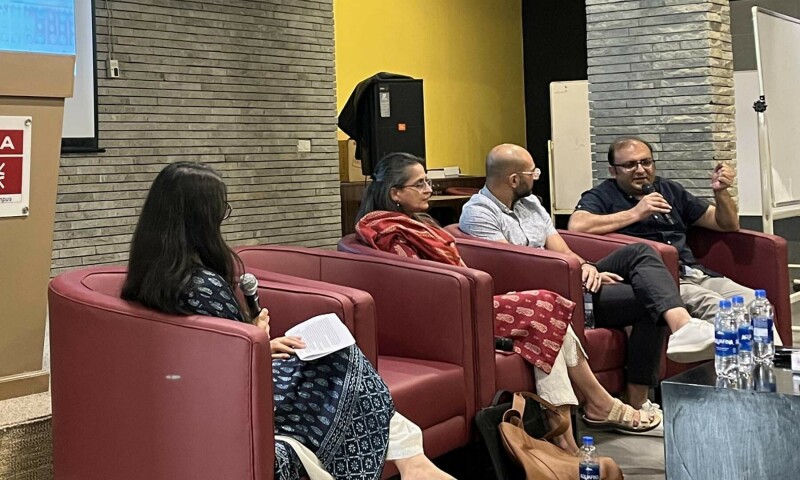“How can someone living in Pakistan for two to four decades sell everything and leave?” asked senior journalist Zia Ur Rehman, echoing a question that many have been wondering since the government announced the November 1 deadline for “illegal immigrants” to leave the country — a policy that has mainly targeted Afghans living in Pakistan.
Rehman was a panelist at the ‘No Country to Call Home: Behind Pakistan’s Expulsion of Afghan Refugees’ talk hosted by the Institute of Business Administration (IBA) on Thursday.
More than 370,000 Afghans have left Pakistan since October 1 — a policy that has received strong support across the country.
Rehman — joined by Abira Ashfaq, a lawyer and human rights activist, and Uzair Younis, a political economist based in Washington D.C. — discussed anti-Afghan sentiment and explained structural, legal and political flaws in the policy.
‘En masse deportation beyond caretaker govt’s jurisdiction’
Rehman explained how the decision to deport Afghan refugees en masse was beyond the caretaker government’s jurisdiction.
Having immersed himself in local Afghan populations across Pakistan, Rehman saw firsthand the plight of Afghans being deported or living in fear of it, which he details in a recent New York Times piece.
Most Afghans built their livelihoods over several decades in Pakistan, their birth country, but are leaving with almost nothing. The government policy of allowing them to carry just Rs.50,000 as they cross the border leaves them with little to start a life in a country many of them have never been to.
“Local hotels in Afghanistan aren’t accepting undocumented individuals, forcing many to take shelter from the cold in shanty tents,” Rehman said.
Meanwhile, Ashfaq, the rights activist, said that Pakistan’s immigration policy is fundamentally flawed; Afghan men married to Pakistani women don’t get citizenship, although foreign women who marry Pakistani men acquire citizenship.
The other most glaring issue is that Afghans being detained in Pakistan have no access to lawyers even though they have the right to — something Ashfaq said she witnessed firsthand when she visited deportation centres in Karachi.
A last-minute success, Ashfaq said, was when she combed through official databases and found that certain detainees had been wrongfully detained and were still set for deportation, till she intervened.
Due to racial profiling by the Karachi police based on appearances and attire, Afghans were indiscriminately being rounded up and thrown in detention centres, Rehman said. Despite having Proof of Registration (POR) cards that legally allow Afghans to live in Pakistan, several have been leaving voluntarily to avoid being harassed and humiliated by the police, they told him.
‘Failed Afghan policy for decades’
The sudden policy shift was the outcome of a failed Afghan policy Pakistan has had for decades, Younis said, answering one of the hundred or so students who packed the lecture hall for this event.
“Pakistan doesn’t have financial or domestic political support anymore,” he said. “The caretaker govt chose this policy to scapegoat Afghans during an economic crisis in Pakistan.”
The government has defended its policy by saying that Afghans are a “burden on the economy” and facilitate smuggling activities across the country.
Younis challenged this notion by explaining that smuggling does not happen in thin air.
“There are networks involved , many of whom are linked to institutions in the government as well as illicit criminal and militant networks,” he said. “So there is an illicit economy that has to be talked about here as well.
Since their arrival in Pakistan, Afghans have been villainized and linked to terrorist activities and the recent rise in crime. However, there is no data to prove this misconception that many Pakistanis continue to cling to, which, Rehman opines, comes from the media’s stereotyping.
On the contrary, Afghans have contributed immensely to the economy, so by deporting Afghans, we’re shooting ourselves in the foot, Younis said. From opening tandoor shops to picking trash to running neighbourhood convenience stores and more, Afghans have enriched the local landscape throughout Pakistan.
Ashfaq delved further into discrimination against Afghans by urging the audience to understand this issue through an imperialist lens.
“This behaviour is synonymous with the colonizers’ way of ruling by dividing,” she said.
She went on to explain that Pakistanis’ inherent hatred for Afghans comes from the way we’ve been forced to think about them. Multinational companies stealing land and resources in Sindh, for example, are also “outsiders”, she explained, but because they hold immense power, Pakistanis don’t condemn their presence in Pakistan.
“Because you don’t see Afghans as part of the political economy, they’re the only ones you punch down on.”
Ashfaq highlighted “institutionalised discrimination” Afghans faced when they were barred from enrolling at public schools and government colleges.
“Marginalized people are more vulnerable when they’re not allowed in government schools,” she said, speaking more broadly of Bengalis and other minorities.
Despite paying taxes and contributing to the GDP, Afghans and Bengalis are not being counted in the population census, which Ashfaq calls a form of “racial apartheid”.
‘Be radical as hell’
When students in attendance asked the panelists for guidance on practical steps on their part, she said: “You have to learn how to be activists and lawyers, and tackle MNCs.”
“And be radical as hell.”
Ashfaq, who is also visiting faculty at IBA, said that events like these are immensely important “because we have to focus on the law and that there is a legal obligation that we have towards Afghans.”


